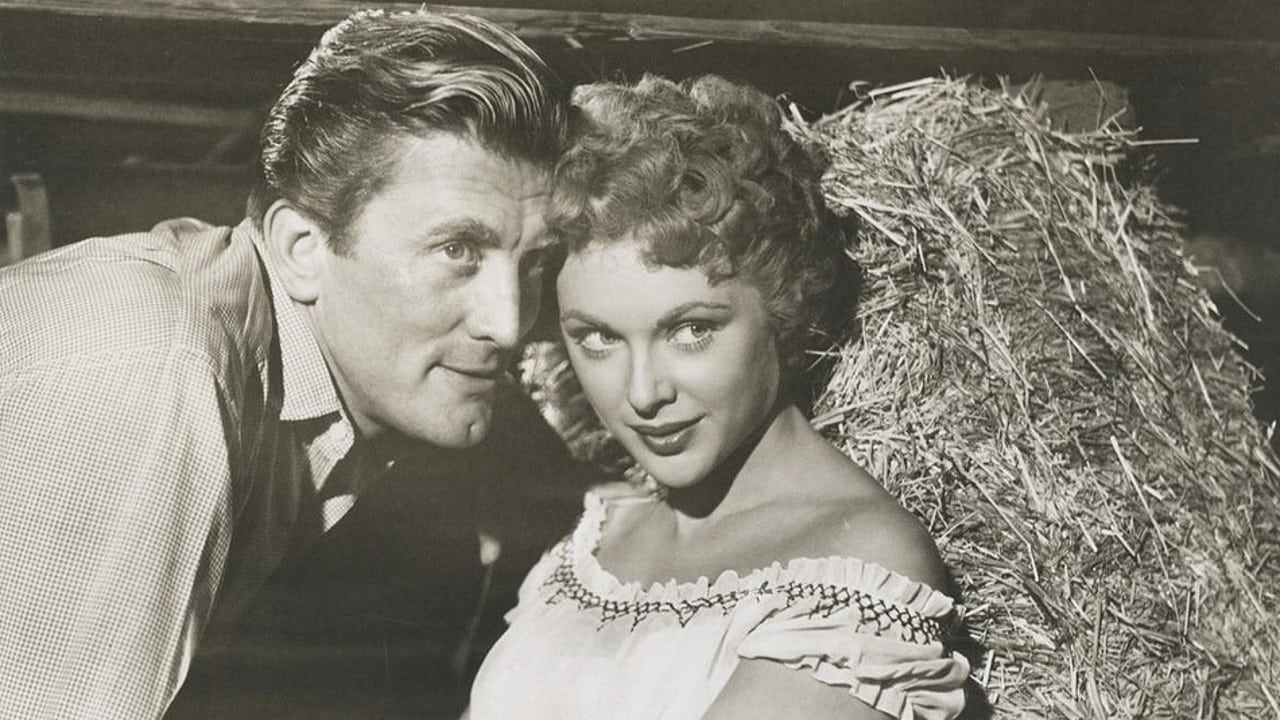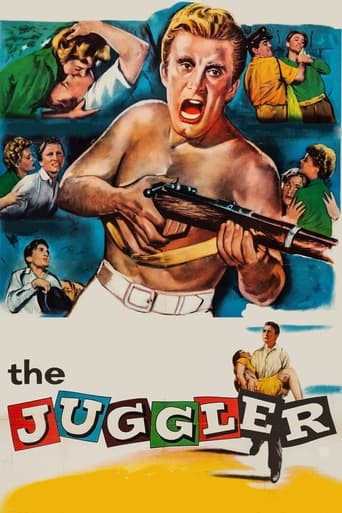Redwarmin
This movie is the proof that the world is becoming a sick and dumb place
Boobirt
Stylish but barely mediocre overall
Brightlyme
i know i wasted 90 mins of my life.
Humaira Grant
It’s not bad or unwatchable but despite the amplitude of the spectacle, the end result is underwhelming.
edwagreen
Stanley Kramer always made successful films dealing with social issues and this 1953 film is no exception to that rule.As a Holocaust survivor who lost his wife and children, Hans Muller (Douglas) comes to Israel in 1949.He reminded me somewhat of Rod Steiger in "The Pawnbroker," as he is unable to come to grips with what has occurred in his life and he constantly confuses his current life with what has happened to him in the past. A routine encounter with an Israeli policeman leads to near tragedy and Douglas runs away to a Kibbutz where he finds love and understanding with a woman and a young sabra who he meets along the way.The final scene where Douglas is trapped in a one- room area is similar to that of his captivity in a concentration camp. The torture expressed on his face was reminiscent of what he would exhibit in "Lust for Life" years later.
wes-connors
The year is 1949 as Jewish refuges arrive in the newly formed country called Israel. Among them is Holocaust survivor Kirk Douglas (as Hans Muller). Once a popular entertainer and expert juggler, Mr. Douglas was used by the Nazis to test drugs. Born in Munich, Germany, he was also tortured in a concentration camp. Less lucky, his wife and children were murdered. Understandably, Douglas is suffering from the horrors he experienced. At one point, he mistakes an Israeli policeman for a Nazi and sends the lawman to the hospital. While the officer wavers between life and death, Douglas goes on the run, believing he will be accused of murder...Along the way, Douglas befriends teenager Joseph "Joey" Walsh (as Yehoshua "Josh" Bresler). The apparently orphaned boy begins as a guide - but he and Douglas quickly develop a "father-son" relationship. In keeping with the familial theme, Douglas later meets young blonde Milly Vitale (as Ya'El). The beautifully-figured widow lost her husband in the recent Arab-Israeli War - and you'd be safe in predicting a romance between Douglas and Ms. Vitale is in the script. It's brought to you by writer Michael Blankfort, producer Stanley Kramer and director Edward Dmytryk. They've got a good lead with Douglas and nice-looking film, shot party on location...Douglas makes a very believable juggler, if not a German. The performance by young Walsh is also quite appealing. The subject matter is excellent, but we don't see much beneath the surface; everything is left to Douglas' anguish. We wonder why he is not returned to his home and given back his career and wealth - after all, we won the war. Watch for a startling scene in which adorably cute Beverly Washburn (as Susy) refuses to give her autographed picture of "The Juggler" to the policeman (Paul Stewart) hunting Douglas. Her father tells the girl, "Sometimes, for the sake of the law, we have to give up our friends." That line stands out like a sore thumb.****** The Juggler (5/5/53) Edward Dmytryk ~ Kirk Douglas, Joseph Walsh, Milly Vitale, Paul Stewart
MartinHafer
This is a film that seems very sincere in wanting to tell an interesting story from a man horribly damaged by the Holocaust, but unfortunately the film had a lot of problems with the plot and casting that interfered with it becoming a better and more memorable film.Kirk Douglas was cast as a German-Jew who has just immigrated to Israel in 1949. Since WWII, we don't know what he's done or where he's been, but he was horribly abused in a concentration camp, so it isn't at all surprising he is emotionally fragile and suffers from a classic case of Post-traumatic Stress Syndrome. In some ways, Kirk was an excellent choice--he's Jewish and did amazingly well in his juggling routines. However, having him play a German named "Hans Muller" was silly, as he acted about as German as Mickey Mouse. Everyone but Kirk had a strong accent in the film--Kirk sounded like an American. Also, while I love his films, Mr. Douglas is NOT one of the more subtle actors in history and a few of his scenes where he struggles with the effects of PTSD were overdone--and were almost silly. And that is NOT something you want in a serious film about a very serious topic.Aside from this casting problem (why didn't they just have Kirk play a man who was originally an American and he was living in Europe?), the other smaller problem about the film is that, at times, it tried a little too hard. Scenes from the kibbutz seemed a tad over-idealistic and lacked realism from time to time.However, despite these serious flaws, the film still was engaging and had one of the earliest and best portrayals of PTSD on film. It's well worth seeing for mental health professionals and people interested in the early history of Israel, but others might find it tough sailing. An earnest and sincere failure that is still a decent time-passer.My advice? See some other films about the Holocaust first--save this one for later if you are so inclined. Some great films about this era you might want to first watch are THE SHOP ON MAIN STREET (from Czechoslovakia), THE SEARCH, SCHINDLER'S LIST, LIFE IS BEAUTIFUL and the TV mega-miniseries, WAR AND REMEMBRANCE. For early Israeli history (post-1948), try EXODUS--it's not perfect but is still far better than this film.
elfinadrawer
Considering that Hollywood never really tackled the Holocaust until Schindler's List and that it only set one other prominent film (Exodus) in Israel, this remarkable movie is amazing on many levels. Douglass shows once again that he was as versatile as any actor, not merely as a juggler and stage-comedian, but also as a rugged but tortured individual on the run from his pursuers. The setting in post war Israel is wonderful, the supporting players all fine, and some of the scenes sublime (the dance sequence at the kibbutz, the couple's tender embrace, the juggling show, etc.). It is one of the few American films that mentions the terrors of the Holocaust in any direct manner, and one of the few that portrays contemporary Israel realistically. Although, as noted by some critics, it has its flaws, including the lack of a German accent by Kirk, it is still an incredible production on so many levels that it deserves to be seen by a greater audience, which may happen, since it was just screened by TCM this afternoon, where I was luck enough to see it.

